- Home
- Scott Kenemore
Lake of Darkness
Lake of Darkness Read online
ALSO BY SCOTT KENEMORE
NOVELS
The Grand Hotel
Zombie, Indiana
Zombie, Illinois
Zombie, Ohio
Zombie-in-Chief
ZEN OF ZOMBIE SERIES
Zen of Zombie
Z.E.O.
The Code of the Zombie Pirate
Zombies vs. Nazis
The Art of Zombie Warfare
Copyright © 2020 by Scott Kenemore
All rights reserved. No part of this book may be reproduced in any manner without the express written consent of the publisher, except in the case of brief excerpts in critical reviews or articles. All inquiries should be addressed to Talos Press, 307 West 36th Street, 11th Floor, New York, NY 10018.
Talos Press books may be purchased in bulk at special discounts for sales promotion, corporate gifts, fund-raising, or educational purposes. Special editions can also be created to specifications. For details, contact the Special Sales Department, Talos Press, 307 West 36th Street, 11th Floor, New York, NY 10018 or [email protected].
Talos Press® is a registered trademark of Skyhorse Publishing, Inc.®, a Delaware corporation.
Visit our website at www.talospress.com.
10 9 8 7 6 5 4 3 2 1
Library of Congress Cataloging-in-Publication Data is available on-file.
ISBN: 978-1-945863-50-9
EISBN: 978-1-945863-51-6
Cover design by Daniel Brount
Cover artwork by Alejandro Colucci
Printed in the United States of America
For Max, who liked this one
Stones have been known to move, and trees to speak.
Augurs and understood relations have
By magot pies and choughs and rooks brought forth
The secret’st man of blood.
—Macbeth (III, iv)
CONTENTS
ONE
TWO
THREE
FOUR
FIVE
SIX
SEVEN
EIGHT
NINE
TEN
ELEVEN
TWELVE
THIRTEEN
FOURTEEN
FIFTEEN
SIXTEEN
SEVENTEEN
EIGHTEEN
EPILOGUE
AUTHOR’S NOTE
ABOUT THE AUTHOR
ONE
They came.
They came, it seemed, from every place on God’s earth south of the city limits. They came with almost no money or formal education. They came never before having ridden in a train. Or a streetcar. Or an automobile. They came former slaves and sons of slaves. Some of the oldest still bore marks from leg irons or overseers’ whips. They came in threadbare clothing and with shoes that were worn clean through. They came with all of their possessions. Everything they owned.
They came from places like Alabama and Mississippi and Texas. (And this, in an age when seventy-five percent of Americans never traveled more than seventy-five miles from the spot where they had been born.) They came from communities where segregation was so powerful, there wasn’t even a word for it. It was no special way of doing things. It was the only way. They came having ridden up in train cars that were, themselves, often segregated. They came hoping to find relatives who had already made the trip up to Chicago. Or friends. Or mere acquaintances. And those who knew nobody had heard there were organizations with names like the Chicago League on Urban Conditions Among Negroes that existed to assist newcomers such as themselves. They had read about these organizations in the newspapers circulated by black railroad porters who worked on the trains that started in Chicago but ran all throughout the South. Many of the newcomers had never before been to a city, much less the second-largest city in the United States. None had seen a lake as large as Lake Michigan. None had seen or smelled or heard anything like the blasted hellscape that was the Chicago stockyards—where more animals were killed each day than any other place on earth.
Many had been sharecroppers. Many had not eaten properly in several days. They were—all of them—taking the biggest risk of their lives. They were wagering everything they had. It might not be much, but it was all on the table.
They came with hope. They came with desperate dreams. They came for the promise of a place less miserable than the one they had left. To some, the rumors of Chicago seemed impossible to credit. The work of a fantasist, surely. A place where black people and white people could ride in streetcars together, and enter businesses through the same doors. A place where blacks owned businesses and homes, and sent their children to proper schools. A place where you could get a job in a factory or slaughterhouse with relative ease, and begin earning a living right away. A place where you could feel free to say what you thought.
And what was perhaps most jarring to these newly-arrived was that the rumors were, essentially, true. This was happening. It was the case. And the sheer astonishment such knowledge instilled could be overwhelming to the point of paralysis.
The world was a different place. The world was going crazy. Going something, at least. These times were not normal. A madness, perhaps a benign one, was allowing this great migration to begin. To gather steam as though it might never stop at all.
A war consumed the world. The whole world. A terror came with that, yes. But could it, really, be all bad, these times of madness, if they also allowed for this change that blew on the wind? That blew across the cotton fields of Georgia and the plantations of Louisiana, and blew people north to settle in the land of Lincoln. To settle in a landscape so cold and hard and alien in the winter that it might have been another planet.
Joe Flippity was his name. He had come himself, years before. He had been among the first. Then he had watched the others who had come after him. He had watched them hard.
It was, more or less, his job.
Crespo came to fetch Joe Flippity on the first day of August. It was evening. Crespo had an idea of where his target might be, but only roughly. For a man like Crespo, that was enough.
Crespo took a streetcar to Katt’s Tavern on South State Street and waited. It was like a place from a Wild West town. Little more than a broken-down house. It did not have electricity or gaslight. The men inside drank by lantern.
Crespo stood by the long wooden bar—crowded and shadowy enough that his white face was not immediately noted. Near the bar was a table. Seated at it were five Negro men, and the only other white in the place. The white man was slight and bookish, with an immaculate moustache and a yellow band around his hat. For the moment, he was doing all of the talking.
“The horses are perfectly identical, see? Actual, no foolin’ identical twins. All the markings and mottlings alike, just as if they’d been printed from the same plates. What we’ll do is take one horse and train it in secret. Out in Michigan there’s a fellow I know who works cheap and won’t rat. The other horse, we put it in circulation over at Hawthorne. Never train it. Give it a meal right before each race. Pretty soon, it has a reputation as the worst horse in Chicago. The odds on it get long. Reeeal long. And that’s when we swap in the twin and bet big. We’ll make a killing, gentlemen. An absolute killing! But you have to swear on your lives to keep it secret. And I need the money tonight. This owner, he doesn’t realize what he has in these twin horses. He doesn’t see the opportunity. Wants to split them up and sell them individual-like. What a tragedy that would be! Gentlemen, please believe me when I say that we have to act fast. . .”
As Crespo looked on, a figure stepped out from the shadows. He was tall and thin and black as jet. He wore a leather coat that fit him closely, despite the August heat. Perhaps he wore it to give the impression of being more powerfully built than he actually
was. The shadow man was silent as he approached the table, seeming almost to float across the dark barroom floor.
“There a problem here?” he asked.
For a moment, only silence.
“We ain’t giving this man no trouble,” one of the Negro men said.
“Yeah,” insisted another. “Mind yours.”
“This man’s not getting any trouble from you,” said the shadow man. “But I think y’all about to receive some trouble from him.”
The figure underneath the yellow-banded hat looked up in confusion that almost appeared genuine.
Then the shadow man opened one side of his coat to reveal a rare treasure. A Colt 1911 in an oiled leather holster. Then—slowly, deliberately—he opened the other side of his coat to reveal something rarer still . . . at least on the South Side of Chicago, at least in the coat of a Negro man. A six-pointed metal patrolman’s star with CHICAGO POLICE stamped across the top and a copper badge number at the bottom. In the center of the star was the great Seal of the City of Chicago, rendered as well as it could be by a crude metal press.
The group stared wordlessly at these marvels.
“This man’s business is getting your money . . . for something that never damn happens,” the policeman said. “That horse he’s telling you about? A few months from now, when you see him on the street and ask where your money is, he’ll tell you it died. Or got stolen. Or died and then got stolen. He’ll say he’s been ruined by the whole affair, and has men he owes money breathing down his neck. He’ll say he fears he is about to be killed or thrown in jail. All that will be a lie . . . but it will be enough to make you leave him alone, which will be his only purpose. And by then, you will have been took. It will already be too late.”
The man with the yellow hatband opened his mouth to object. The policeman put a firm hand on his shoulder and regarded him icily.
“Mr. Weil, what’d I tell you about working my part of State Street?” the policeman asked. “You got a set of balls, coming back down here. I give you that.”
“You got it all wrong,” Weil said, his eyes flashing left and right, then left again. “This is the real deal this time! I’m not trying to put it over on nobody. Don’t you see? I’m trying to let these fine men in on the con with me. We’re going to make money together. These men know they’re in the big city now. . . Chicago! . . . where anybody has a shot to get rich! Don’t they deserve that shot, officer?”
Over at the bar, Crespo—who had apprehended Weil a time or two himself—smiled at the con man’s tenacity. Even when cornered, he continued to pitch, to spin, to wheedle.
The tall, dark police officer did not seem as amused.
“Time for you to go, Mr. Weil,” said the officer, helping the man with the yellow hatband to his feet. “I’m sure you understand.”
“I-” Weil began.
“You nothing,” said the policeman. He pinned one of Weil’s arms behind his back and marched him to the door.
Weil made a show but did not really resist. As he was shoved outside, he looked back through the doorway to the men at the table. His expression told them this was all a misunderstanding. That something like this had never happened before. That it was outrageous. And that he’d be back with them at his earliest convenience.
It was clear those men still wanted to believe. They would probably try to find Weil later and ask him—plead with him, even—to let them in on the deal. The lure of easy money was just that strong. In a boomtown like Chicago—where new fortunes seemed to be made every day—there was only one true fear. But it ran deep and it consumed everyone. It was the fear of missing your chance. Of looking straight at it and not seeing it. And then having to watch as some other miserable son of a bitch used it to make a million dollars.
The tall police officer returned from the door, sans Weil. The men sitting at the table looked as though they wanted to fight. To jump the officer and beat him—maybe to death—1911 and badge be damned.
One of them pushed back his chair violently.
That was when Crespo stepped out from the bar.
“Flip!” Crespo said loudly. He made sure to let his own holster show. The men at the table thought twice, and then a third time too. For the moment, they elected to remain where they were.
“Salvatore Crespo,” Flip said with a smile. “The devil brings you down to South State Street?”
“I’m looking right at him,” Crespo said. “You got time to take a walk? Maybe even a ride?”
“I reckon I do,” Flip said evenly. He gave the men at the table a last, long look that said they’d thank him later.
Back outside, the air was warm and the night sky was clear. It smelled a lot less like lamp oil and beer, and a lot more like shit. The police officers began to walk north.
“I start to think there’s a part of town where Weil won’t ply his trade, and then I see him there,” Crespo said.
“You kidding?” Flip replied. “Mister Yellow loves him some black folks. He loves him some green, more precisely. Black folk ain’t got as much as some others, but he’ll still take it on an off night.”
Crespo laughed. They passed a man selling fried pig parts on a dirty, broken cart. One of his offerings was an entire face, still smiling wide. The vendor, in contrast, failed to offer even a grin.
Beside the pig vendor was an illegal brothel that operated openly. The smell of perfume, liquor, and come eked out from its open door, as did syncopated music from a dingy band in the lobby. (The music style had recently been named after the come-smell. Or maybe it was the other way around. Flip had never been entirely clear on this point.)
“Feel like you didn’t travel all this way to chat about a two-bit con man,” Flip said.
Crespo nodded. He looked Flip up and down. The Italian’s expression said he might be debating how to best begin a good joke.
“How long you been on the force?” he eventually asked.
They approached an alley containing a dead horse.
“You know,” Flip replied, smiling to reveal bright, almost perfect teeth. “Long as I been in town, seems like.”
“I thought so,” Crespo said. “And how long have there been gentlemen of color like yourself on the force? Negro officers?”
Flip had not expected the interrogation to become so historical.
“While before me,” he answered after considering it. “First of us due to retire soon. I heard of Negro officers as far back as—what?—maybe the seventies. Right after the war between the states.”
They slowed and regarded the dead horse for a moment, then proceeded on.
“And yet they still don’t let you wear a uniform,” Crespo observed. “No marching in parades. No proper funeral when one of you goes down in the line of duty. Just a badge and a gun, and keep things quiet in your part of town.”
Flip silently let his gaze drop to Crespo’s waist, indicating that the Italian, in plain clothes, also had only these items at the moment.
Crespo grinned.
“Thing is,” Crespo continued, “sometimes things can change. It builds for a while—you can feel it building—and then—Boom!—something happens, and the world is different. Italians didn’t used to get much respect either. You know, they say we’re part Negro, just a little bit.”
“Italy close to Africa,” Flip observed.
Crespo grinned again.
“I was a member of the Black Hand Squad,” he continued. “That’s a few years ago now, but it changed everything for Italian officers in this town. Some of the men from that squad are working in high places in the department now. Very high places. And everybody’s gonna turn out for our funerals.”
Flip had heard about the Black Hand Squad. Around 1900, a team of Italian extortionists had begun operating in Chicago. Mostly, they preyed on other immigrants from Italy. To dissuade those tempted not to pay protection, the extortionists—who called themselves the Black Hand—killed ten to twenty Chicagoans a year. They left the bodies at busy intersect
ions with knives protruding from the corpses’ backs and notes claiming credit. At first, the city had seemed powerless to stop them. Those who went to the authorities for assistance received little, and usually wound up dead. It started to become embarrassing. Then, in a rare show of competence, the city had created the Black Hand Squad—a contingent of twenty-five policemen tasked solely with busting the extortion ring. What made the squad unique was that every member had been an immigrant from Italy or the son of immigrants from Italy. Within six months, the squad had caught most of the Black Hand players and successfully reduced the extortions from a geyser to a trickle. (They were never stopped entirely, but had been put down to levels that Chicago could, more or less, find tolerable.) It was said the squad members had been richly rewarded for their success.
“I heard that was you,” Flip allowed. “Yes, I heard all about that.”
“Oh did you, now?” Crespo said.
“You’d be surprised what I hear all the way down on South State,” Flip said.
“Then I’ll tell you something you didn’t hear,” Crespo told him. “I know you didn’t hear it because we never told nobody. And that’s that we were shit scared. All of us. Thought we were gonna die for sure. Some of us wanted to enlist in the army rather than face the Black Hand. But in the end, we took them down. And they never touched us. We all survived.”
“Why you tellin’ me this?” Flip asked, suddenly growing uneasy.
They neared a stop where a streetcar would take them north to the Loop—the skyscrapered center of the bustling city.
“Because,” said Crespo, “it’s time for you to meet the man.”
Twenty minutes later, Flip and Crespo stepped off a crowded streetcar and into another world. Rich men in cloaks strolled in groups, smoking and talking confidentially. Women, almost always accompanied by men, wore fine hats decorated with feathers from rare birds nearly murdered out of existence for the plumage. The buildings around them were tall and electrified. There was the smell of hot food and beer and pungent cigars.
Crespo conducted Flip down one of the only dark alleyways in sight.

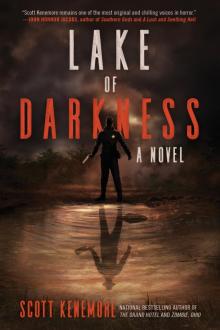 Lake of Darkness
Lake of Darkness The Zen of Zombie
The Zen of Zombie Zen Of Zombie (Zen of Zombie Series)
Zen Of Zombie (Zen of Zombie Series)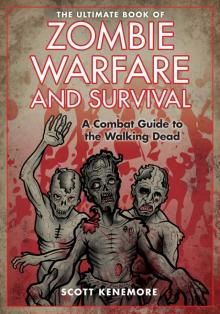 The Ultimate Book of Zombie Warfare and Survival
The Ultimate Book of Zombie Warfare and Survival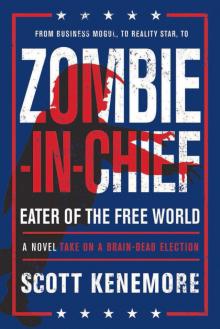 Zombie-in-Chief
Zombie-in-Chief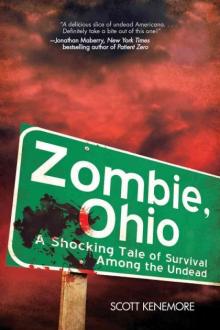 Zombie, Ohio
Zombie, Ohio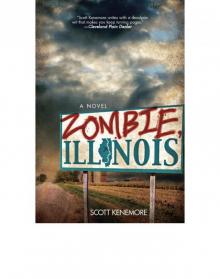 Zombie, Illinois
Zombie, Illinois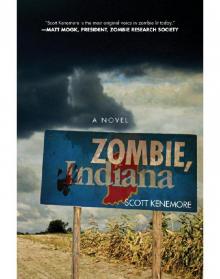 Zombie, Indiana
Zombie, Indiana